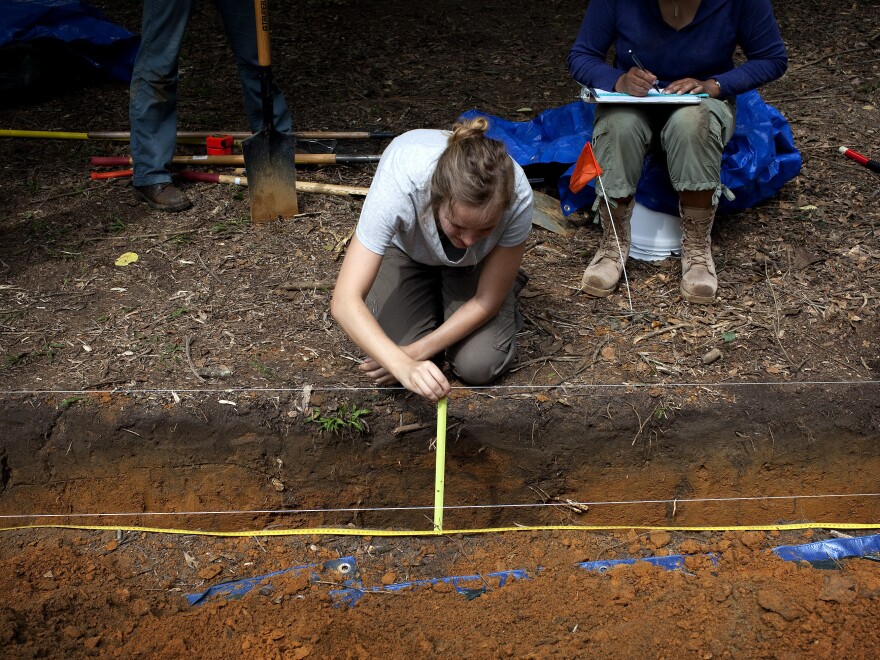Researchers at the University of South Florida are fighting with the state over access to the grounds of a now-closed reform school.
For decades, the Dozier School for Boys was notorious for the harsh treatment boys received there. Now, a forensic anthropologist and her team want permission to exhume dozens of bodies they found in unmarked graves, but are meeting resistance from state officials.
White House Boys
They're called the White House Boys — a group of men, many now in their 60s and 70s — who were sent to the Dozier school when they were children. They take the name from a small white building on the school grounds where boys were beaten. Jerry Cooper was sent to the school in 1961. He says guards beat the boys using a leather strap.

"These were not spankings. These were beatings, brutal beatings," Cooper says.
Cooper and other White House Boys say they know of children who died from the beatings. A few years ago, the state investigated and said it found no evidence that staff at the school had been responsible for any student deaths.
The White House boys and some family members of those who died there dismissed the report as a whitewash. The state report said 50 boys were believed buried in unmarked graves. But it said it would not be possible to identify and exhume remains from individual gravesites.
That's when forensic anthropologist Erin Kimmerle got interested in the story.
"Initially, seeing that the state's response was 'We've done everything we can and there's nothing more to be done,' we just felt that there's a lot that science has to offer," Kimmerle says
Kimmerle is an associate professor at the University of South Florida who has worked with international teams to help locate and identify remains in the Balkans, Peru and Nigeria.
With the state's permission, she and a team of researchers used ground penetrating radar to locate nearly 100 unmarked graves at the school, nearly double the amount previously known.
Backed by relatives of boys who died there, Kimmerle and her team asked the state for permission to exhume the bodies so remains can be identified and returned to their families. The administration of Gov. Rick Scott so far has refused, saying it lacks the authority to approve exhumation.

That came as a disappointment to Glen Varnadoe. His uncle, Thomas, died at the school in 1934.
"The state has an obligation to deliver my uncle's remains to me. Me and my uncle have a civil right to his remains, and the state is currently violating those civil rights by not supplying his remains to us," Varnadoe says.
More Questions To Answer
Although Gov. Scott is fighting exhumation, Kimmerle and her team are supported by Florida's attorney general, members of the Legislature and by Sen. Bill Nelson. Nelson has called Gov. Scott's action blocking the exhumations "inexcusable." Earlier this year, he spoke to reporters after touring the school grounds.
"Let's start trying to find the answers to these questions: What happened? How many? What happened to them? Were there crimes committed? And let's get to the bottom of it," Nelson said.
The University of South Florida is asking the state to reconsider its exhumation request. Kimmerle says when her team did their work, they found unmarked graves in a wooded area and some under a roadway.
"So, it's about finding individuals for families that are asking, but it's also about preservation. If we're finding them now, and they essentially were lost, if something isn't done to preserve them, they will become lost or destroyed," Kimmerle says.
Along with the fight over whether to excavate the unmarked graves, there's another question to be answered at the Dozier school. For most of its 100-year history, the reform school was strictly segregated. Former residents of the school say that because of where the unmarked graves are located, those found so far are likely those of black children. The whites who died, they believe, were buried elsewhere.
Kimmerle and her team are looking for another burial ground at the school, graves that, if found, will raise still more questions about what happened to the children who were housed at Florida's most notorious reform school.
Copyright 2021 NPR. To see more, visit https://www.npr.org. 9(MDAxNzg0MDExMDEyMTYyMjc1MDE3NGVmMw004))








